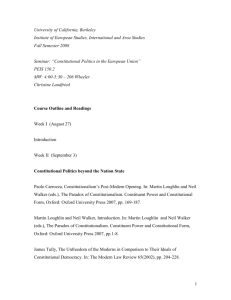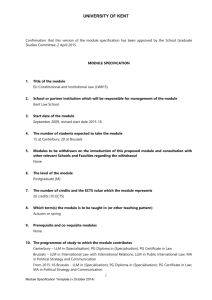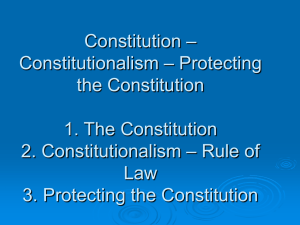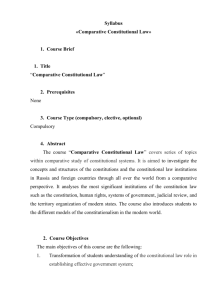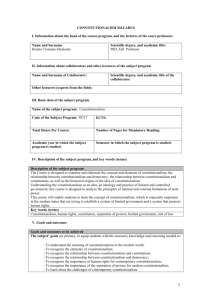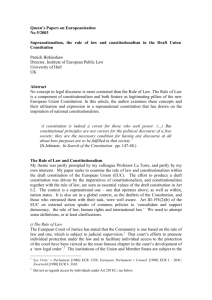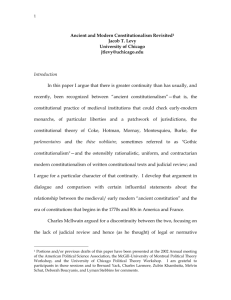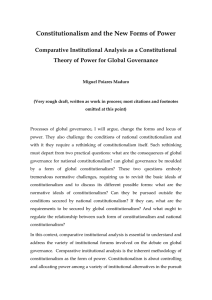module specification cover sheet module
advertisement
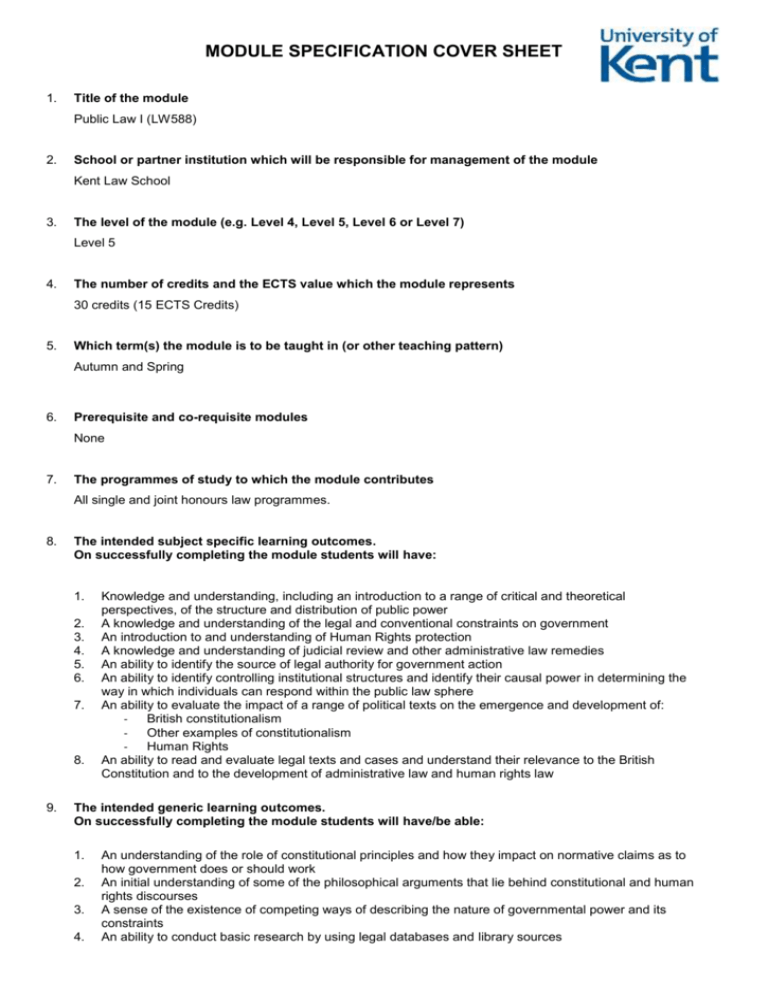
MODULE SPECIFICATION COVER SHEET 1. Title of the module Public Law I (LW588) 2. School or partner institution which will be responsible for management of the module Kent Law School 3. The level of the module (e.g. Level 4, Level 5, Level 6 or Level 7) Level 5 4. The number of credits and the ECTS value which the module represents 30 credits (15 ECTS Credits) 5. Which term(s) the module is to be taught in (or other teaching pattern) Autumn and Spring 6. Prerequisite and co-requisite modules None 7. The programmes of study to which the module contributes All single and joint honours law programmes. 8. The intended subject specific learning outcomes. On successfully completing the module students will have: 1. 2. 3. 4. 5. 6. 7. 8. 9. Knowledge and understanding, including an introduction to a range of critical and theoretical perspectives, of the structure and distribution of public power A knowledge and understanding of the legal and conventional constraints on government An introduction to and understanding of Human Rights protection A knowledge and understanding of judicial review and other administrative law remedies An ability to identify the source of legal authority for government action An ability to identify controlling institutional structures and identify their causal power in determining the way in which individuals can respond within the public law sphere An ability to evaluate the impact of a range of political texts on the emergence and development of: British constitutionalism Other examples of constitutionalism Human Rights An ability to read and evaluate legal texts and cases and understand their relevance to the British Constitution and to the development of administrative law and human rights law The intended generic learning outcomes. On successfully completing the module students will have/be able: 1. 2. 3. 4. An understanding of the role of constitutional principles and how they impact on normative claims as to how government does or should work An initial understanding of some of the philosophical arguments that lie behind constitutional and human rights discourses A sense of the existence of competing ways of describing the nature of governmental power and its constraints An ability to conduct basic research by using legal databases and library sources MODULE SPECIFICATION 5. An ability to construct an argument based on authoritative sources and convey it in both oral and written form, with appropriate and accurate use of language, referencing and citation 6. To analyse case law, identify the key concepts, the inter-relation between the facts and the legal arguments, and provide a coherent account of the judgement 7. To advance coherent legal and political arguments in both verbal and written form 8. An ability to provide a sustained analysis properly researched and thought through in essay form 9. To make proper use of web based material and to distinguish good sources from inadequate ones 10. To make proper use of the library resources by way of law reports, articles and monographs and textbooks 10. A synopsis of the curriculum TERM 1 Constitutionalism: history, theories, principles and contemporary significance Models of Government at national, local and supra-national levels TERM 2 Human Rights – history and contemporary significance and deployment The scope of governmental authority and its limits Judicial review and other forms of citizen redress 11. Reading List (Indicative list, current at time of publication. Reading lists will be published annually) Allen, Michael and Thompson Brian (2005) Cases and Materials on Constitutional and Administrative Law 8th Edition, (Oxford University Press). Bradley A.W and Ewing K.D (2014) Constitutional and Administrative Law 16th Edition, (Longman). Held, David (2006) Models of Democracy 3rd Edition, (Policy Press). Jeffery Jowell, Dawn Oliver and Colm O’Cinneide (eds.) (2015), The Changing Constitution (8th edition) (Oxford University Press). Le Sueur, Sunkin and Murkens (2013), Public Law Text, Cases and Materials, 2nd edition (Oxford University Press). Loveland, Ian (2015) Constitutional Law, Administrative Law and Human Rights: A Critical Introduction 7th Edition, (Oxford University Press). Partington, Martin (2008) English Legal System, (Oxford University Press). Sunkin, Maurice and Payne Sebastian (1999) The Nature of The Crown, (Oxford University Press). Tomkins, Adam (2005) Our Republican Constitution, (Hart Publishing). Turpin, Colin and Tomkins Adam (2011) British Government and the Constitution 7th Edition, (Cambridge University Press). References to academic journals such as Public Law and The Modern Law Review and online sources. 12. Learning and Teaching methods The module has 300 study hours. There will be two 1 hour lectures weekly over the duration of the module excluding reading and writing weeks (40 hours). Seminars will be one hour weekly (20 hours). The remaining 240 hours will be dedicated to private study, including private reading groups, personal reading, writing, revision, seminar preparation and revision. Students will be expected to organise themselves into private reading groups to tackle the materials. They will use Held’s Models of Democracy as a key text. 13. Assessment methods. 2 Module Specification Template (September 2015) MODULE SPECIFICATION The module will be assessed by examination 50% and coursework 50%. The assessment strategy is both formative and summative and is set out in summary form in the table below. Assessment Type Week % Purpose A writing task of no more than 2000 words to develop and assess skills necessary in academic writing for instance, citation skills and formal academic writing skills and skills necessary for structuring argument 10 20 The writing task promotes the ability to construct argument based on authoritative sources and convey it in written form, using authoritative sources with appropriate and accurate use of language, referencing and citation; it allows the students to demonstrate their knowledge and understanding of a range of critical and theoretical perspectives on the structure and distribution of public power, and requires the evaluation of the impact of a range of political texts on the emergence and development of British and other examples of constitutionalism. It provides valuable feedback to the student prior to them undertaking the essay. An essay of no more than 2500 words to assess in particular students’ abilities in argument, conducting independent research and using multiple sources 20 30 The essay requires the student to demonstrate (i) knowledge and understanding of the structure and distribution of public power, including the ability to identify the source of legal authority for government action. (ii) An ability to identify controlling institutional structures and identify their causal power in determining the way in which individuals can respond within the public law sphere. (iii) knowledge and understanding of the legal and conventional constraints on government including Human Rights, (iv) the ability to read and evaluate legal texts and cases and understand their relevance to the British Constitution and to the development of administrative law and human rights law (v) an ability to evaluate the impact of a range of political texts on the emergence and development of British constitutionalism, other examples of constitutionalism, and Human Rights (vi) skills of research and evaluation and identification and deployment of sources and the key skill of developing written argument based on authoritative sources with an appropriate and accurate use of language referencing and citation. It will build upon the earlier writing task and provide feedback on the student’s knowledge and understanding prior to the examination. An examination of 3 hours 50 The exam helps to identify the level of knowledge and understanding of the constitutional significance of the English legal system and the general constitutional principles underpinning the British and other constitutions, and the philosophical arguments that lie behind constitutional and human rights discourses. It 3 Module Specification Template (September 2015) MODULE SPECIFICATION requires the ability to write clearly and master complex issues and read and evaluate legal and political texts and cases and understand their relevance to the operation of the British Constitution and to the development of administrative law and human rights law. The exam questions will cover the complete course encouraging a consolidation of learning and providing a sound foundation for further study of public law in both core and optional subjects. 14. Map of Module Learning Outcomes (sections 8 & 9) to Learning and Teaching Methods (section 12) and methods of Assessment (section 13) Module learning outcome 8.1 8.2 8.3 8.4 8.5 8.6 8.7 8.8 Learning / teaching method Hours allocated Lectures 40 X X X X X X X X Seminars 20 X X X X X X X X Private Study 240 X X X X X X X X Assessment method Specify word length, duration, individual or group work (as appropriate) Writing Task 2000 words X X X X X X X X Essay 2500 words X X X X X X X X Exam 3 hours X X X X X X X X 9.1 9.2 9.3 9.4 9.5 9.6 9.7 9.8 9.9 X X X X Module learning outcome Learning / teaching method Hours allocated Lectures 40 Seminars 20 X X X X X X X Private Study 240 X X X X X X X Assessment method Specify word length, duration, individual or group work (as appropriate) Writing Task 2000 words X X X X X X X 4 Module Specification Template (September 2015) 9.10 X X MODULE SPECIFICATION Essay 2500 words X X X X X X X Exam 3 hours X X X X X X X X X X 15. The School recognises and has embedded the expectations of current disability equality legislation, and supports students with a declared disability or special educational need in its teaching. Within this module we will make reasonable adjustments wherever necessary, including additional or substitute materials, teaching modes or assessment methods for students who have declared and discussed their learning support needs. Arrangements for students with declared disabilities will be made on an individual basis, in consultation with the University’s disability/dyslexia student support service, and specialist support will be provided where needed. 16. Campus(es) or Centre(s) where module will be delivered: Canterbury FACULTIES SUPPORT OFFICE USE ONLY Revision record – all revisions must be recorded in the grid and full details of the change retained in the appropriate committee records. Date approved Major/minor revision Start date of the delivery of revised version Section revised Impacts PLOs (Q6 & 7 cover sheet) 02/12/15 Minor Sep-16 10,11,12,13,14 No 5 Module Specification Template (September 2015)


